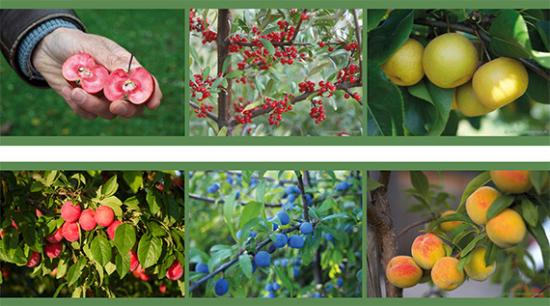Lassee Edible Landscape
PRESERVE FRUIT DIVERSITY
"Beyond the courtyard, near to the doors, lies a large four-acre orchard, surrounded by a hedge. Tall, heavily laden trees grow there, pear, pomegranate and apple, rich in glossy fruit, sweet figs and dense olives. The fruit never rots or fails, winter or summer. It lasts all year, and the West Wind's breath quickens some to life, and ripens others, pear on pear, apple on apple, cluster on cluster of grapes, and fig on fig..."
The Odyssey, Book VII, 112-121
Since time immemorial, fruits and nuts have formed vital ingredients of man's diet. By means of careful selection, the centuries brought forth innumerable varieties, which were, in part, planted in very limited locations, perfectly adapted to the respective climate and soil. Over the past decades, numerous local fruit species have disappeared. The remaining diversity and all the newly bred varieties will only be preserved if they are cultivated, multiplied, and eaten.

Old and new fruit varieties
Many people desire to plant their gardens with "old" fruit varieties and "traditional" fruit trees and are often amazed when they hear that, for example, the origin of the apple is Kazakhstan and that almost all popular "homegrown" fruit varieties in fact have a long journey behind them. In some generations the "foreigners" planted here will probably naturally be "old" and "homegrown" fruit varieties.
Fruit trees - a project for generations
Trees require years to become established at their location and several more years to yield their full potential. After that, however, they bestow their precious fruit upon several generations.
Preserving the diversity of fruit requires partners
Our partners for fruit diversity:
Limbach Nursery/Zahradnictvo Limbach: An annually partially changing assortment of robust and rare fruit varieties and species. 90091 Limbach, Slovakia, Tel: 0042 (0) 1/905651175, www.shop.zahradnictvolimbach.sk
Praskac Pflanzenland: Large selection of rare fruit varieties. Processing upon request of species currently not in stock. 3430 Tulln, Austria, Tel: 0043 (0) 2272/62460, www.praskac.at

07.10.2025
CatchHedge - Potenziale von Hecken im Zeichen des Klimawandels
mehr ...16.+17.09.2025
32nd Conference of the Danube Region
mehr ...12.09.2025
Grundlagen der professionellen Bio-Mandel-Produktion
mehr ...10.09.2025
Agroforst u. Marktgärtnerei, Symbiose
mehr ...25.06.2025
Feldtag - StripTill im Bio-Mais im Trockengebiet
mehr ...25.06.2025
Seminar: Wildbienen- und Nützlingsförderung im Biolandbau
mehr ...24.06.2025
BOKU Green Plate Forum 3.0
mehr ...24.06.2025
Die Maulbeere - Kultur, Produktion u.Verwendung
mehr ...17.06.2025
Frühjahrstagung Österr. Gesellschaft für Agrar- und Umweltrecht (ÖGAUR)
mehr ...13.06.2025
Seminar: Artenvielfalt in Ackerbauregionen fördern
mehr ...03.06.2025
Seminar: Keine Angst vor der Ackerdistel
mehr ...03.06.2025
Agroforstsysteme: Anbau-Modelle der Zukunft
mehr ...20.05.2025
IDM-Generalversammlung 2025
mehr ...15.05.2025
Seminar: Unkräuter/Beikräuter erkennen und als Zeigerpflanzen nutzen
mehr ...13.+14.05.2025
Bodenforum Österreich - Frühjahrstreffen
mehr ...04.05.2025
Tageskurs: Perma-Veggies - Mehrjähriges Gemüse und essbare Stauden
mehr ...03.05.2025
Waldgärten-Exkursion
mehr ...08.04.2025
Agroforst: Traditionelle Systeme von Land- und Forstnutzung verbinden
mehr ...26.+27.03.2025
Tagung "Weniger Bodenversiegelung, mehr Zukunft - wie gelingt das?"
mehr ...20.+21.03.2025
Vitiforst - wie integriere ich Gehölze in meinen Weingarten?
mehr ...


